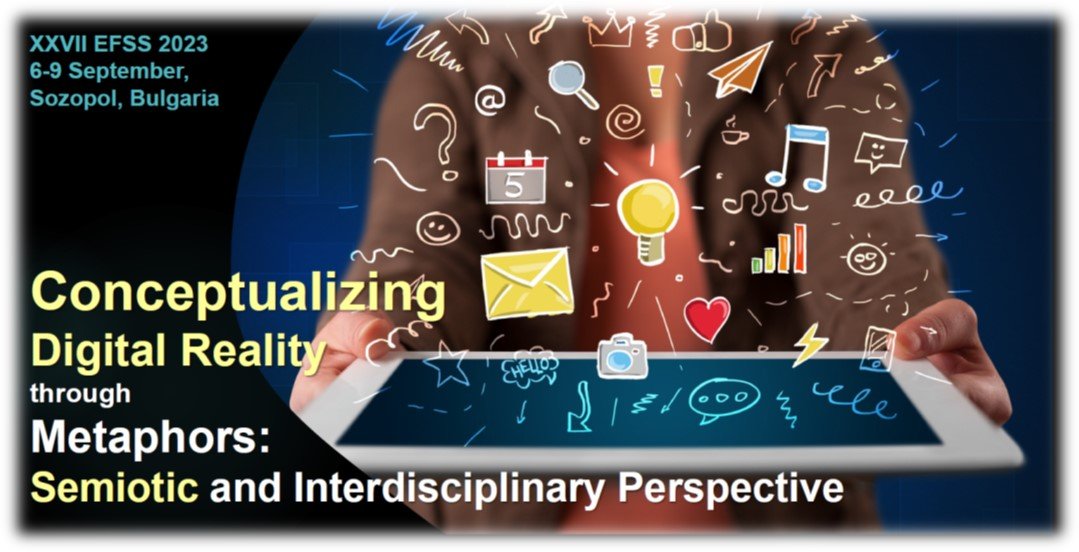Call for Participation EFSS XXVII “Conceptualizing Digital Reality through Metaphors: Semiotic and Interdisciplinary perspective” 6-9 September, Sozopol, Bulgaria

Organized by Southeast European Center for Semiotic Studies, New Bulgarian University
Conceptualizing digital reality through metaphors: semiotic and interdisciplinary perspective
XXVII EFSS’23, 6-9 September, Sozopol, Bulgaria
The Internet, new digital technologies, social media, and more recently, artificial intelligence/machine learning services, have caused profound changes in people’s lives globally, all within just one generation. According to Prensky (2001), the digital semiosphere is inhabited by two main subcultures and to illustrate this concept he uses a now famous metaphorical binomial: digital natives VS digital emigrants. We argue that in how these two subcultures conceptualize a commonly shared digital reality lies an interesting semiotic problem worthy of scholarly discussion. We all live in a world inhabited by mouses, (anti)viruses, streams, windows, bugs, thumbnails, spam, clouds, ports, kernels, engines, platforms, etc. These metaphors were originally used to gain popularity for important technological innovations that were impossible to commercialize in their “native” engineering terminology. They fulfilled metaphor’s primary function of transferring meaning from one well-known domain of experience to another that had yet to conquer its own semantic space.
But here comes a generation for whom something like a reverse conceptualization of reality is occurring: what was the tenor of the original metaphors becomes the primary reality of the semantic prototypes. This is when the first mouse you encounter is the computer mouse, when long before you’ve realized the functions of your own memory you’re pestering your parents to buy you a console with bigger computer memory, or conceptualizing “freezing” when your computer constantly freezes because the air is… too hot for its processor, etc. Something like a derivative paradox of this complex semantic situation occurs in the field of education. There, digital immigrants teach digital natives how to make it in a digitally dominated socio-economic reality. The communication problem is obvious, but it seems to be only on the surface of a deeper clash of worldviews, where there is a divergence in the fundamental values and even in the structure of temporality.
As we can relate, metaphors structure our understanding of digital media. It is necessary for us to highlight in this call that not only language metaphors are to be found and analyzed in digital ecosystems. Nowadays that screen-based technologies have become pervasive, it is the right moment to reflect on the changes and evolution of visual metaphors that convey meaning of computing processes – from desktop metaphors to extended reality (including virtual and augmented reality content and devices). Moreover, as research on digital and procedural rhetoric has shown (Bogost 2010, Sack 2019), it is paramount to look at how our digital media work, what are their rules of behavior, and how their operational logic relates to ideologies and culture.
We look forward to contributions that develop and deepen the following basic questions without limiting it to them:
– Digital metaphors we live by
– Metaphors we compute by
– The jargons of digital culture
– Digital natives VS Digital emigrants
– Eco-based metaphors for data-driven societies
– Conceptualizing metaphors in videogames
– Visual and graphic metaphors of the digital
– Metaphorical interfaces
– Metaphorical creativity in digital technology advertisements
– Digital metaphors and multimodal translation
– Metaphors and conceptual clashes in education
Keynote speakers:
Mattia Thibault (Tampere University) Author of the book Ludosemiotica, il Gioco tra Segni, testi, pratiche e Discorsi (2020, Ludosemiotics, the Game between Signs, Texts, Practices and Discourse)
Everardo Reyes (Université Paris VIII Vincennes – Saint-Denis) Author of the book Designing Interactive Hypermedia Systems (2017)
Ivan Mladenov (Bulgarian Academy of Science) Author of the book Conceptualizing Metaphors. On Charles Peirce’s Marginalia (2006, 2014)
Open Workshops:
“Conceptualizing the Digital through Environmental Metaphors” chaired by Federico Biggio
“Metaphoricity in Virtual Reality” chaired by Momchil Alexiev
Open Round Table:
“Semio-economic analysis of Videogames” chaired by Kristian Bankov and Eduard Marinov
In order to enrich the interdisciplinary perspective we are negotiating with more keynote speakers who are leading researchers in Digital Culture.
Selected papers will be published in the 7th issue of the journal Digital Age in Semiotics and Communication (ISSN, DOI, CEEOL)
REGISTRATION FORM (Deadline for registrations: 15 July)
Registration fee: 40 Euro (50 for non IASS members, Free for participants from ERUA partner universities). The fee includes:
– access to all lectures, workshops, seminars and round tables,
– badge and materials,
– 5-6 coffee breaks,
– A welcoming reception on 7 September
EFSS 2023 is organized by the Southeast European Center for Semiotic Studies and the team of WP2 of European Reform University Alliance (ERUA), with the support of the STRATEGIC DEVELOPMENT FUND of New Bulgarian University
The XXVI EFSS is an event under the auspices of the International Association for Semiotic Studies (IASS)
Please, spread the pdf document in your networks!

Leave a Reply
You must be logged in to post a comment.